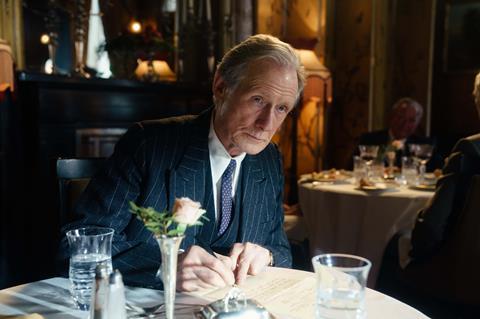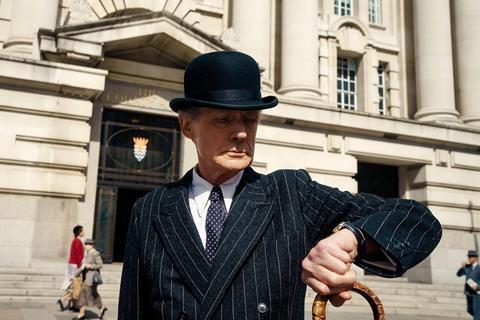Close to two decades on from his Bafta win for Love Actually, Bill Nighy’s beautifully restrained performance in Living sees him back in the awards conversation — and in a rare big-screen lead role.

Should Bill Nighy find himself in contention for accolades during the current film awards season, he will doubtless be invited to various ceremonies where excerpts from his lead performance in Oliver Hermanus’s Living will be projected for the audience. Most nominees accept this as a benign ritual of such proceedings and will have a grateful face prepared for the applause that inevitably follows. But as one who monastically shuns any opportunity to see himself on screen, it is likely the roving cameras will find Nighy staring intently at the floor or even, as Screen International witnessed during an event at this year’s BFI London Film Festival, sticking his fingers in his ears.
“Everything is fine unless I watch it,” the veteran actor explains. “If I watch, everything is not fine, and it’s all stolen from me. The disparity between what is on screen and what I thought was happening [while filming] is great, and therefore it’s always disappointing. Even when I was young I just couldn’t bear it, so I gave it up a long time ago.”
Cinemagoers clearly feel no such compunction when it comes to watching Nighy on screen, at least as far as Living is concerned. Arriving in UK cinemas in November following its January bow at Sundance and subsequent screenings at Venice, Telluride and Toronto, the Lionsgate release has been a solid success at the UK and Ireland box office, grossing $3.7m (£3.1m) at press time. And Living’s nine nominations at the British Independent Film Awards, including one for Nighy in the lead performance category, should elevate the film’s profile further ahead of a limited late-December US release via Sony Pictures Classics.
It seems producers Stephen Woolley and Elizabeth Karlsen were onto something when they invited Nighy to dinner alongside Kazuo Ishiguro and his wife — the evening resulted in the Nobel Prize-winning author suggesting a reworking of Akira Kurosawa’s 1952 classic Ikiru (To Live), with Nighy in the lead role as the buttoned-down civil servant who discovers his days are numbered. “I didn’t know this at the time, but [Ishiguro] had always wanted to transpose the movie from 1950s Tokyo to 1950s London,” says Nighy. “It’s a period he’s particularly interested in, as is Stephen; it’s kind of their sweet spot.”
Ikiru lead actor Takashi Shimura was belatedly nominated for a Bafta for the role, his citation in the now-defunct foreign actor category coming eight years after its Japanese release. Sixty-two years later, Nighy is in the frame to earn his own best actor awards, his graceful performance having earned some of the best notices of a distinguished career. The 72-year-old actor himself is unruffled about the prospect, modestly expressing satisfaction that the film “is playing so well and I’m considered okay in it”. It is a reticence his character would no doubt appreciate, the widowed Mr Williams being a man of so few words he is nicknamed “Mr Zombie” by one of his junior colleagues.
“I like that degree of restraint. I think it’s funny and it can also be quite moving,” remarks Nighy.
“Psychiatrists would say it’s not a great way to conduct yourself, but from the point of view of acting it can be very interesting to express things with not very much.” A lot of work was done for him by the impeccable tailoring his character was supplied by costume designer Sandy Powell. “The hat took some wearing, though,” he says of the formal bowler Williams rarely leaves home without. “It’s like they’re made of iron. If a house brick fell from a great height onto your head, you’d be fine. It’s like you’re wearing a crash helmet.”

Turning point
Restraint was not an issue the last time Nighy found himself in the film awards conversation, his performance as debauched rock star Billy Mack in Richard Curtis’s Love Actually (2003) being the very definition of larger than life. The role was a turning point for the affable Brit, winning him a best supporting actor Bafta that led in turn to a role in Disney’s Pirates Of The Caribbean franchise. “It changed everything,” he tells Screen International. “It was a hit, and if you’re in a hit it means you’re more castable. It changed the way I went to work, and it meant I didn’t have to audition ever again. Ask any actor — if you’re fortunate enough for that to happen, it’s a marvellous development.”
Nighy’s supporting actor Bafta for Love Actually arrived in the same year he received a lead actor TV Bafta for miniseries State Of Play — aptly reflecting the way he has been perceived by the two media. On the small screen, thanks in part to the strong relationships he has cultivated with writer/directors such as Curtis, David Hare and Stephen Poliakoff, he has been empowered to take centre stage in dramas including Gideon’s Daughter (2005), The Girl In The Café (2005) and Page Eight (2011). On film, by contrast, his metier has tended to be that of the colourful supporting artist, making the most of limited screen time in projects as diverse as Shaun Of The Dead (2004), Harry Potter And The Deathly Hallows: Part One (2010) and Pride (2014).
“If the writing is good, I’m always interested, whatever the part is,” he declares. “I’ve taken relatively small parts in things that I just wanted to be in, because I thought they were great projects and good things in the world. But it can be hard when you play smaller roles, where you come in halfway through the shoot and you only have three scenes to make your mark on the film. You’re not going to get more opportunities, so you feel like you’ve got to get it right first time.
“I’ve been unspeakably lucky,” says Nighy in conclusion. “I’ve been incredibly fortunate to have worked with great people and then work with them again on numerous occasions.”
For all his copious credits, though, he is quick to dispel any suggestion he is something of a workaholic. “It looks like I’m never off a film set, but I do get a lot of time off,” he reveals. “I easily say ‘no’ more than I say ‘yes’, and in fact spend quite a lot of time loafing about.”

























No comments yet